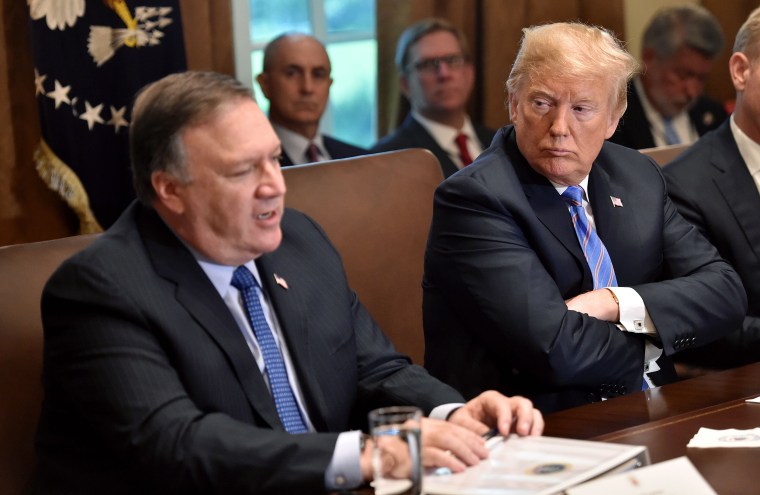When the international nuclear agreement with Iran was reached five years ago, much of the west feared that Tehran wouldn't live up to its side of the deal. It's why the Joint Comprehensive Plan of Action (JCPOA) included a "snap back" provision: if Iran failed to honor its commitments, economic sanctions would immediately be re-imposed.
In practice, the trigger was a moot point: each of the countries involved in the agreement stuck to the deal. At least, that is, until Donald Trump came along, decided he didn't care that the policy was working, and announced that the United States would stop honoring its commitments.
Predictably, Iran proceeded to accelerate its nuclear program -- the program was on indefinite hold before Trump got to work -- concluding that there was no longer any point in holding up Tehran's side of the deal.
This week, that led the White House to make an exceedingly difficult pitch: the Trump administration is demanding the full enforcement of an international agreement it's already abandoned. (The State Department has been reduced to arguing that we're a "participant" in the deal we've officially withdrawn from.)
As the Associated Press reported, the pitch was not well received.
U.S. Secretary of State Mike Pompeo insisted Thursday that the United States has the legal right to "snap back" U.N. sanctions even though President Donald Trump pulled out of the 2015 nuclear deal between Iran and six major powers that was endorsed by the U.N. Security Council. Russia and China, along with European allies Britain, France and Germany, who often disagree, are united in declaring the U.S. action "illegal" on grounds that you can't withdraw from a deal and then use the resolution that endorsed it to re-impose sanctions.
This came less than a week after Pompeo suffered a related embarrassing defeat when the United Nations Security Council "rejected a proposal to indefinitely extend an arms embargo on Iran, with even America's strongest allies refusing to buckle under pressure from the Trump administration to take a harder line."
There was some speculation among experts that countries like Britain, France, and Germany would at least pause as a diplomatic courtesy to consider the United States' position in more detail. Yesterday, however, they didn't see the point in delaying their rejection of Pompeo's demand.
Ironically, our allies and partners were condemning the U.S. position right around the time Donald Trump boasted at a campaign event about how much he's improved international respect for his country.
It's hard to overstate the scope of the White House's failure. I realize there's a lot of political news unfolding right now, but Trump and Pompeo have screwed up an important foreign policy -- making the United States and its allies less safe in the process -- to a staggering extent.
As a New York Times analysis added overnight, "A diplomatic standoff over restoring international sanctions against Iran may be the most vivid example yet of how the United States has largely isolated itself from the world order -- instead of isolating Tehran, as the Trump administration intended."
It's not easy to (a) isolate the United States; (b) undermine our national security interests; and (c) bring friend and foe together in opposition to our demands, all at the same time. And yet, Trump and Pompeo have managed to pull it off.
What's more, this fiasco may yet get worse. The U.S. secretary of State declared after his failures yesterday that the administration still intends to move forward with the re-imposition of sanctions on Iran, but in order for the policy to be fully effective, Team Trump would need the cooperation of international partners willing to enforce the policy.
And as this week has helped prove, our international partners think we're wrong.
All the Republican president had to do was nothing. Trump and his team could have simply left the policy alone, allowing it to continue to work, leaving the United States in a vastly stronger position than it is now.
But in this case, doing nothing proved to be too difficult for this administration.
Postscript: None other than former White House National Security Advisor John Bolton wrote an op-ed for the Wall Street Journal, arguing that the Trump/Pompeo argument is a mistake.
In case this isn't obvious, Bolton is a ridiculously far-right hawk on Iran. If even he isn't on board with the administration's current strategy, it's a striking development.

